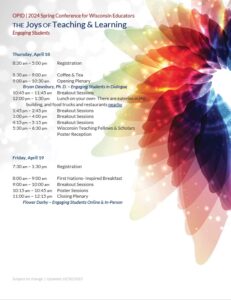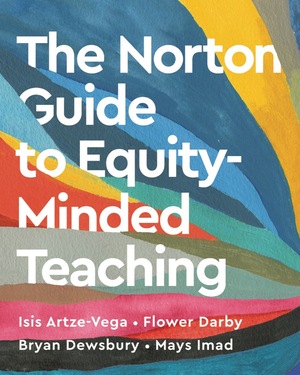
Thursday, April 18 & Friday, April 19, 2024
Memorial Union, Madison
Our teaching and learning practices begin and end with students. Engaging students in learning is an ongoing challenge and doesn’t happen without thoughtful, intentional efforts. Every class is different and requires nuanced approaches depending on the students, the class modality (in-person, online, or hybrid), and context. The Covid pandemic exposed the complex lives of our students, and instructors, and the multiple stressors that impact our lives. The pandemic may be under control, but some stressors remain. As educators, how are we ensuring that all of our students are engaged and supported to succeed? What strategies and approaches have you found effective or promising? We invite you to share your experiences engaging students in the joys of learning, and look forward to seeing you and your systemwide colleagues together at OPID’s annual conference.
Opening Plenary- Dr. Bryan Dewsbury
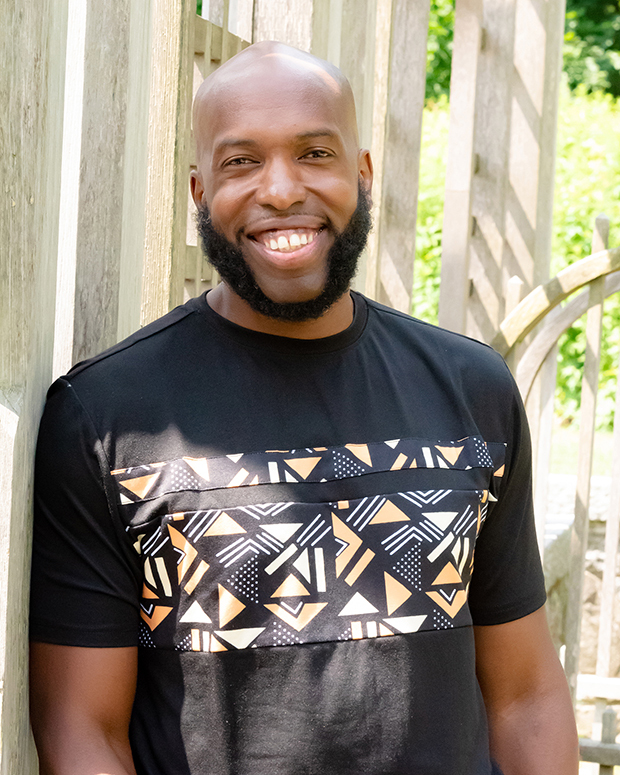
Dr. Bryan Dewsbury
Thursday, April 18, 2024
Engaging Students in Dialogue
College classrooms hold the promise of providing students with rich experiences to help them thrive, in spite of differences in backgrounds, ideologies, histories. To realize this promise, we must complicate our notion of what it means to teach, regardless of subject matter. Using examples from the historical relationship between education and social progress, and an equity-minded approach to a science classroom, we will collectively re-envision ways to engage students in fruitful, respectful, and meaningful dialogues.
Dr. Bryan Dewsbury is Associate Professor of Biology and Associate Director of the STEM Transformation Institute at Florida International University. He is the Principal Investigator of the Science Education and Society (SEAS) research program, a team blending research on the social context of teaching and learning, faculty development of inclusive practices, and programming to cultivate equity in education. Previously, he was at the University of Rhode Island. Bryan is a Fellow with the John N. Gardner Institute, where he assists institutions of higher education cultivate best practices in inclusive education.
Closing Plenary- Flower Darby
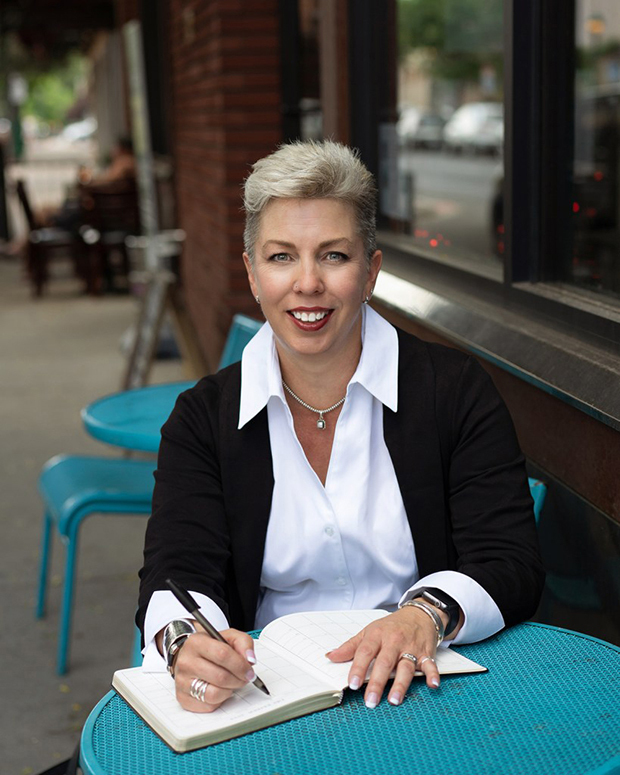
Flower Darby
Friday, April 19, 2024
Engaging Students Online and In Person
Feeling connected with other people in a class predicts increased motivation and better engagement with course concepts, other students, and the instructor. Increased motivation and engagement lead to better learning, greater retention of new information, enhanced persistence, and improved academic performance for all students. As we seek to advance equitable learning outcomes among students, especially those from historically underrepresented or marginalized groups, a deliberate focus on fostering connections, rapport, and a sense of belonging can make a powerful difference in students’ learning and success. We’ll explore evidence-based practical strategies for both in-person and online courses to help students engage, connect, and learn.
Flower Darby is an Associate Director of the Teaching for Learning Center at the University of Missouri. In this role she builds on her experience teaching in person and online for over twenty-six years, as well as experience gained in her previous roles as Director of Teaching for Student Success and Assistant Dean of Online and Innovative Pedagogies, to empower faculty to teach effective and inclusive classes in all modalities. Flower is the author, with James M. Lang, of Small Teaching Online: Applying Learning Science in Online Classes (2019), and she is an internationally sought-after keynote speaker.
Additional Support
OPID’s Spring Conference was supported, in part, by the Digital Learning Environment (DLE) of the
Universities of Wisconsin. DLE is an advisory council chaired by Julie Pohlman, Director of Libraries
and Academic Technology.
Spring Conference 2024 Program
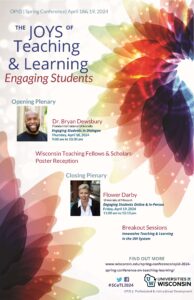
Supplemental Speaker Recommendation
by Isis Artze-Vega (Valencia College), Flower Darby (University of Missouri), Bryan Dewsbury (Florida International University), Mays Imad (Connecticut College)
From the W.W. Norton & Co. Website:
Written by renowned teaching and learning experts, this guide offers concrete steps to help any instructor striving to ensure that all students—and, in particular, historically underserved students—have an equal chance for success. Here you’ll find actionable tips, grounded in research, for teaching college classes online, in person, and everywhere in between.
While this title is a print book, it is also available as a free ebook for educators. To learn more and register for access, visit https://seagull.wwnorton.com/equityguide
Bryan Dewsbury
- The HHMI Biointeractive MOOC on Inclusive Teaching
Bryan Dewsbury served as one of the advisors for this biointeractive MOOC. This asynchronous course aims to deepen educators’ knowledge of inclusive teaching practices. The course was designed with undergraduate introductory life science educators in mind, but components of the course will resonate with educators in other contexts. The course consists of six modules:
-
Podcast: Equity-Minded Teaching
Tea for Teaching
June 28, 2023
Dr. Mays Imad and Dr. Bryan Dewsbury, co-authors of The Norton Guide to Equity-Minded Teaching.
Flower Darby
-
Podcast: The Road Forward
Tea for Teaching
July 12, 2023 -
Podcast: Small Teaching Online with Jim Lang, Flower Darby and Dawn DiPeri
Trending in Education
April 29, 2021 -
Reading: Why You Should Rethink Your Resistance to ChatGPT
The Chronicle of Higher Education, November 2023
Questions?
Programmatic inquiries may be directed to:
Fay Akindes, Director of Systemwide Professional and Instructional Development, UW System, fay.akindes@wisconsin.edu, (608) 263-2684.
For technical support contact:
Erin McGroarty, Program Associate, Office of Academic Affairs, UW System, OPID@lists.wisconsin.edu, (608) 262-8778.

